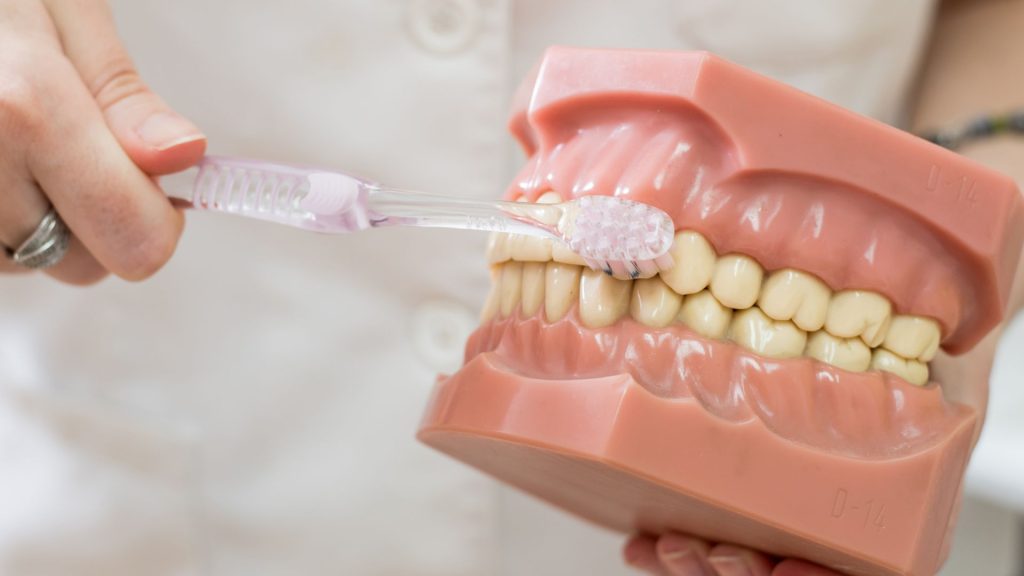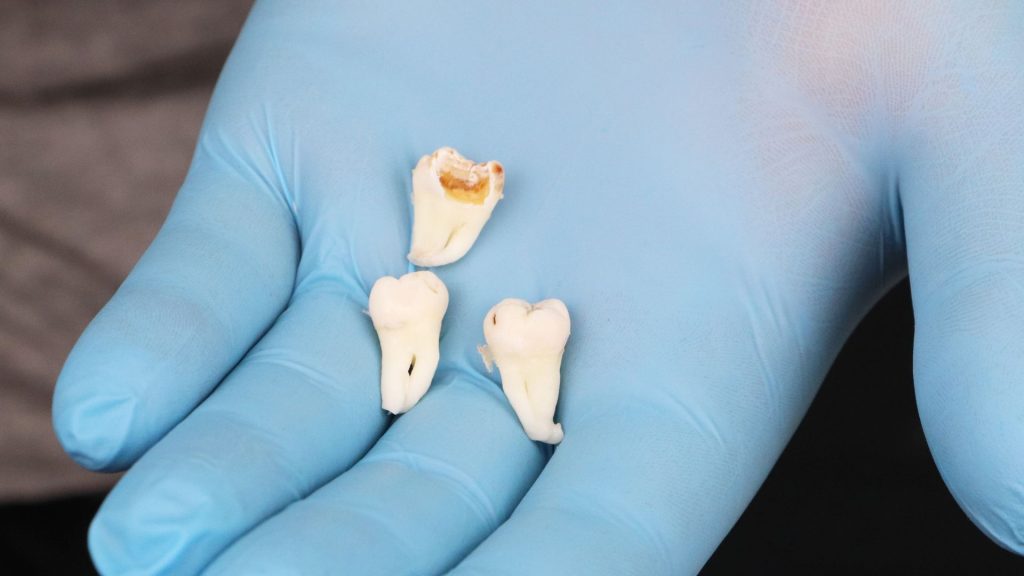When can I brush my teeth after wisdom teeth removal? Usually, you should wait at least 24 hours before brushing your teeth again. During this first waiting time, the blood clot can form and the repair process can start. However, follow your oral surgeon or dentist’s advice since the timing may vary based on the extraction’s intricacy and your recovery process.
Let’s explore when to start brushing following wisdom teeth removal, how to do it safely, and more. We hope this information will help you comprehend wisdom teeth removal recovery and establish the ideal oral hygiene conditions.
Clean Mouth After Wisdom Teeth Removal


After having your wisdom teeth taken out, you’ll need to clean your mouth very carefully. This is a very important thing to do to keep your gums and teeth healthy, prevent illness, and help you get better quickly: The following steps clean the mouth after wisdom teeth removal:
Mouth Wash
First, use a water solution or mouthwash without alcohol to rinse your mouth. Mix the cleaner with warm water as advised and rinse your mouth for about 30 seconds.
Then, dribble the solution out and spit it out. It removes germs and dirt from the mouth.
Use A Soft Brush
After surgery, the region should not be scratched or irritated, therefore use a gentle brush. Keep in mind that proper hygiene necessitates frequent brush replacements.
Gentle Brushing
Do what you usually do, but be gentle and careful. Pay close attention to the area around the cut, but don’t hit it directly. Limit how much you touch the damaged area when you brush.
Also, avoid direct contact with the extraction site and try to avoid touching it for the first several days.
Rinse After Brushing
Rinse your mouth with physiological saline or warm water after you brush to get rid of any leftover toothpaste and make your mouth feel clean and fresh.
In short, after wisdom teeth removal, wipe the mouth carefully to prevent damaging the surgery region and bleeding. So, please ask your dentist any questions.
When Can I Brush My Teeth After Wisdom Teeth Removal?


When you can start brushing your teeth again after having your wisdom teeth taken out depends on how the surgery was done and how well you are healing. Here are the things that made me decide this:
Surgical Method
- If you underwent open surgery: Most of the time, you can gently brush your teeth 24 to 48 hours after surgery. But do what your doctor says, because there may be special conditions.
- If you missed or had horizontal wisdom tooth surgery: It may take longer, usually between 3 and 7 days, to be able to brush. This gives the cut time to heal before you start brushing again.
Recovery Status
Everyone has a different way to get better. If your treatment goes well and you don’t have any unexpected problems, pain, or edema, you may be able to start brushing your teeth again sooner. But, if the cut hurts, swells, bleeds a lot, or takes a long time to heal, wait until it has been fixed before touching it.
However, every case is different, so it’s important to follow what your dentist tells you. Your condition will inform his advice. Get in touch with your dentist for specific guidance if you’re unsure about anything.
Notes On Cleaning Teeth After Wisdom Teeth Removal
After wisdom teeth removal, daily brushing helps preserve dental cleanliness and recuperation. To avoid harming the post-operative injured region, some restrictions and precautions must be observed. Remember to brush softly and carefully after wisdom teeth removal. To recuperate successfully and comfortably, follow your dentist’s recommendations:
- Stay away from the incision and try to avoid touching it as much as possible. To prevent further injury or bleeding, you should brush carefully around the incision but not contact it directly.
- Brush your teeth carefully and avoid touching the injured region. Don’t apply too much force or touch the incision, since doing so might cause discomfort or irritation.
- Avoid brushing too hard or too fast, deeply, or long. Excessive force might harm the wounded region and soon scrape the incision.
- If your dentist tells you to do anything, do it exactly as he or she says. Based on your current healing and the kind of surgery used, he will be able to provide you with tailored advice.
Finally, brushing after wisdom teeth removal helps preserve dental cleanliness and recuperation. However, safety should always come first, so brush softly and carefully to prevent any discomfort or damage.
Conclusion


After removing your wisdom teeth, you’ll need to take proper care of your mouth. Your dental care provider should be equally committed and competent. All wisdom teeth extractions at Spring Orchid Dental Clinic are performed by highly trained professionals using state-of-the-art equipment. We understand that asking “When can I brush my teeth after having my wisdom teeth taken out?” is common.
At Spring Orchid Dental Clinic, we provide thorough information on the best time to start brushing after wisdom teeth removal and ensure that you get dental advice. With our cutting-edge surgical method and dental care, you may confidently clean your teeth again after having your wisdom teeth out. When cleaning your mouth, avoid touching the affected area and instead use the methods recommended by your dentist.
FAQs
Is Brushing Too Hard After Wisdom Teeth Removal A Sign?
If you are brushing too hard after having your wisdom teeth out, you may experience any of the symptoms listed below. Common symptoms include:
- Pain or discomfort: Brushing too hard may cause pain around your wisdom teeth extraction site. Pressure may injure and hurt the surgical site.
- Bleeding: If you detect bleeding from the wisdom tooth extraction site or when brushing, you may be using too much pressure. Check for injury and modify brushing if bleeding occurs.
- Swelling: If you see swelling or redness in the area where the wisdom tooth was taken after brushing, this can also be a sign that you are brushing too hard. Pressure may irritate and swell soft tissue.
- Sensitivity: After brushing, if the wisdom teeth removal site is sensitive, you may have struck too hard and damaged the soft tissue or surgical region.
Do You Need A Specific Toothbrush And Toothpaste After Wisdom Teeth Removal?
You may use your usual toothbrush and toothpaste after getting a wisdom tooth extracted. But there are things to think about while picking out a toothbrush and toothpaste:
- Brush: Choose a soft-bristled brush to minimize bleeding and damage to the wisdom teeth extraction site. Soft brushes clean teeth without aggravating damaged areas. For cleanliness and efficacy, replace the brush periodically.
- Toothpaste: Regular fluoride toothpaste prevents cavities. Gentle toothpaste won’t irritate the afflicted region. Avoid toothpaste with strong smells or irritants.
Can You Skip Brushing After Wisdom Tooth Extraction?
No, it’s crucial to brush after wisdom teeth extraction to preserve oral hygiene. However, cleaning following wisdom tooth extraction requires certain considerations. After having wisdom teeth out, it’s important to keep the mouth clean and free of food debris and germs to lessen the likelihood of an infection. To prevent harm and suffering, brush after wisdom teeth extraction softly.
Keep up with your regular dental hygiene routines after having your wisdom teeth out. Brushing softly and following your dentist’s advice will aid healing and dental health.





